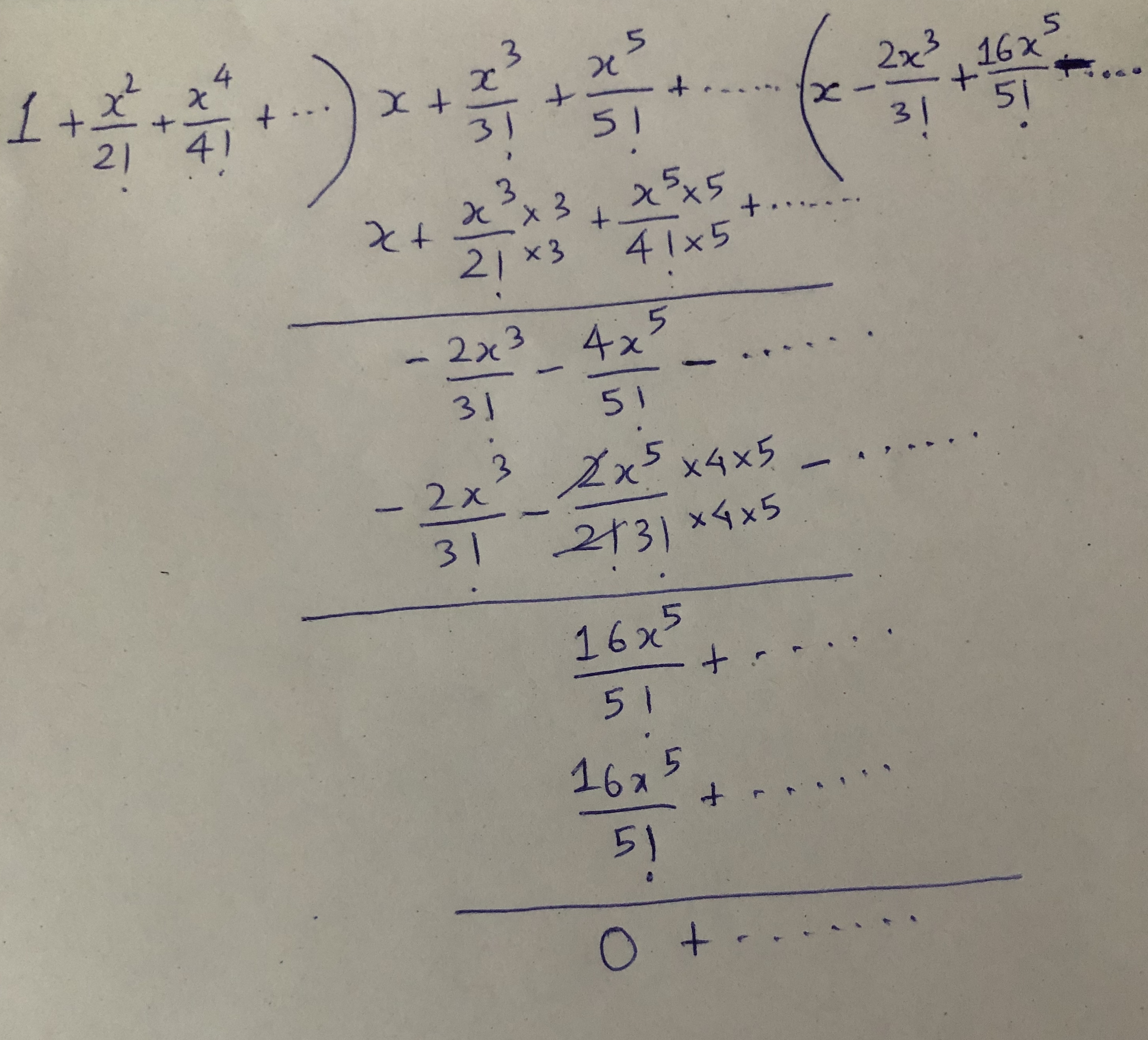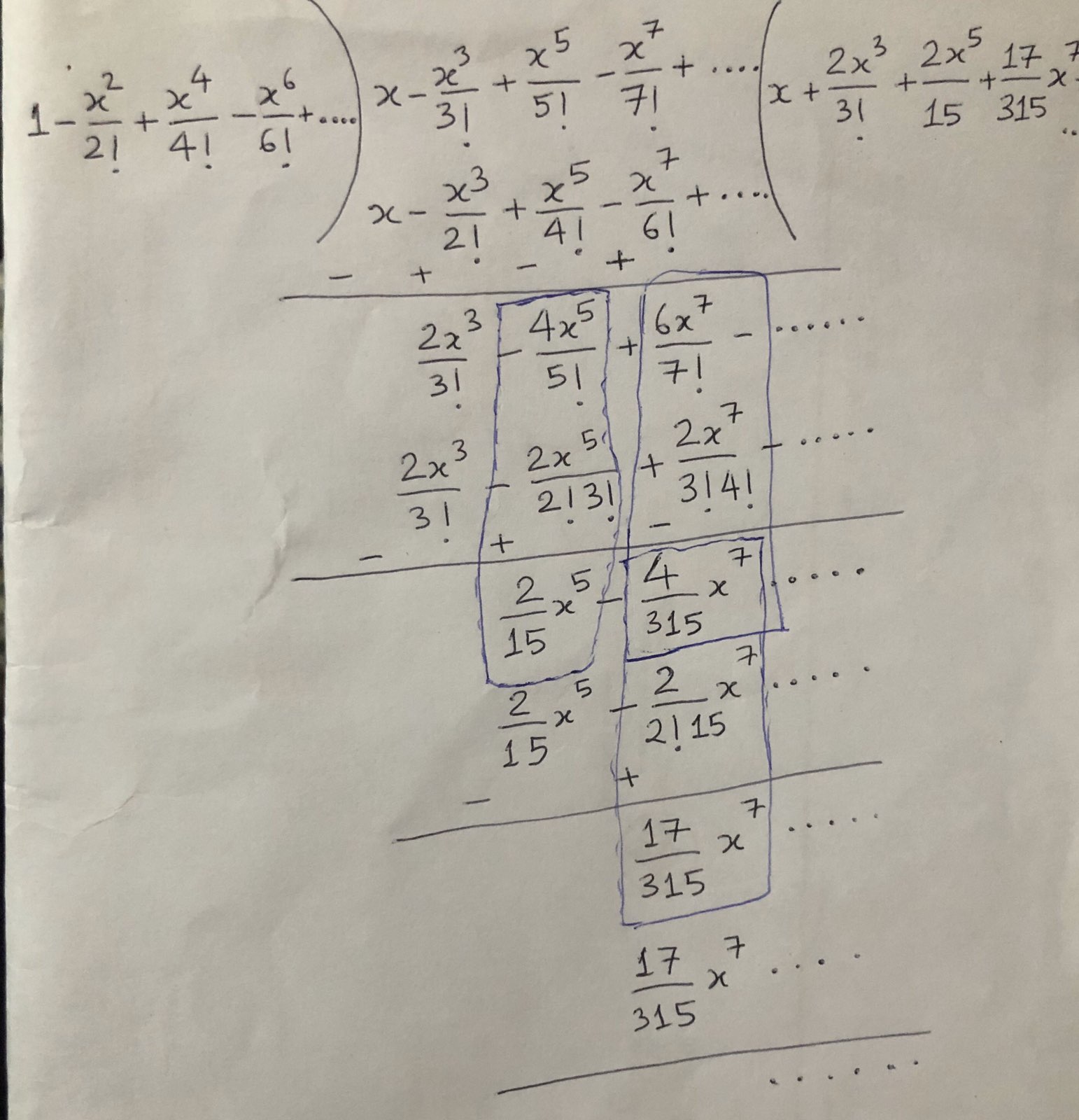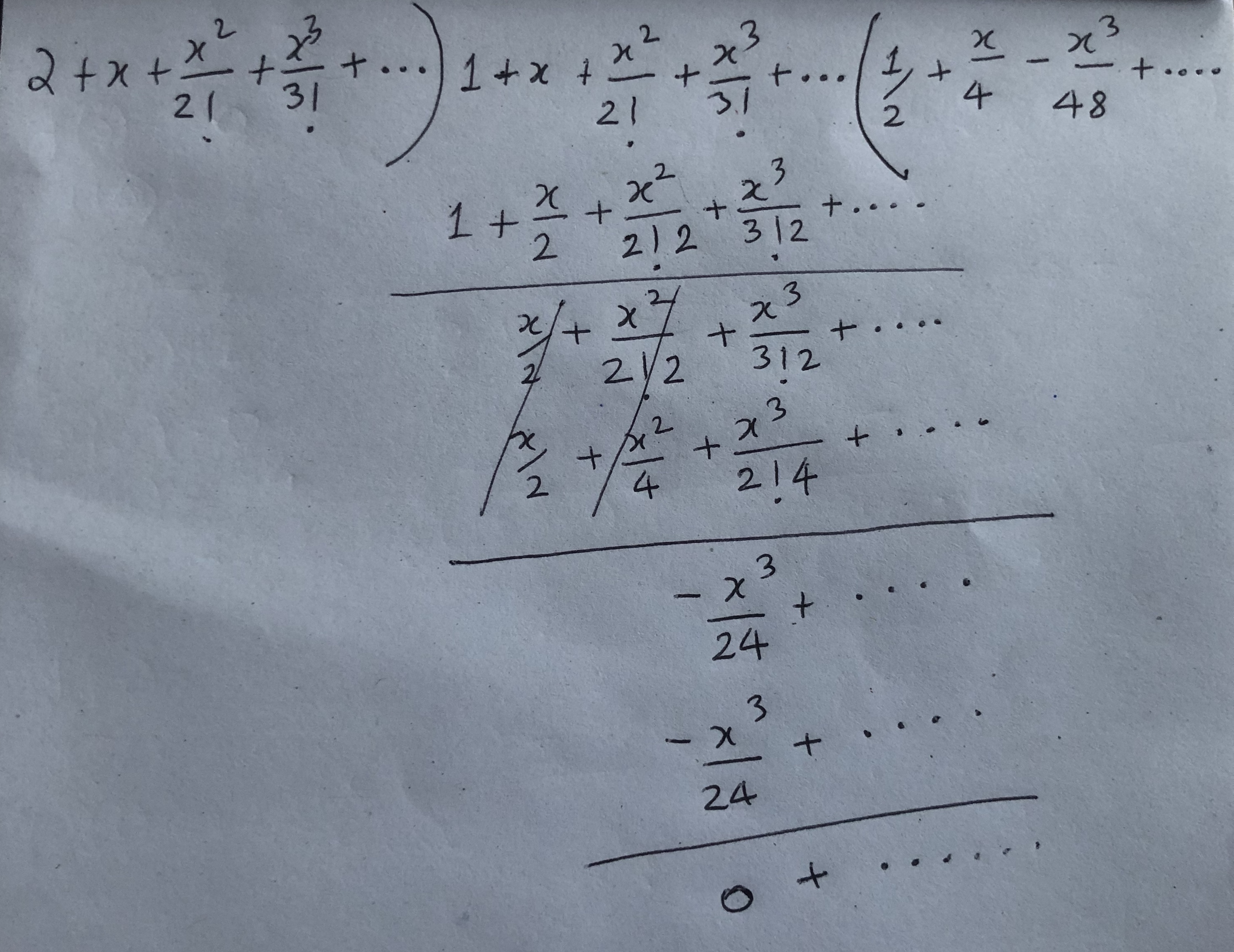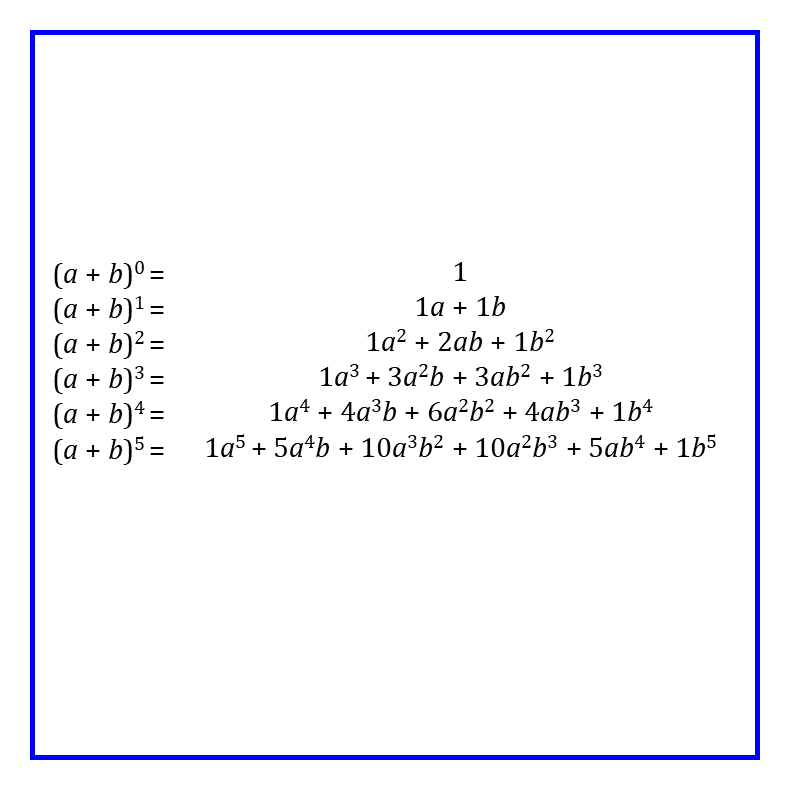Chapter 8 Mean Value Theorems-II
Formulas for the expansion
Taylor’s theorem in finite form with Lagrange’s form of remainder
f(a+h)=f(a)+hf′(a)+h22!f″(a)+…+hn−1(n−1)!fn−1(a)+hnn!fn(a+θh)
where 0<θ<1
The term hnn!fn(a+θh) is the remainder Rn.
Taylor’s theorem in finite form with Cauchy’s form of remainder
f(a+h)=f(a)+hf′(a)+h22!f″(a)+…+hn−1(n−1)!fn−1(a)+hn(n−1)!(1−θ)n−1fn(a+θh)
where 0<θ<1
The term hn(n−1)!(1−θ)n−1fn(a+θh) is the remainder Rn.
Maclaurin’s series in finite form with Lagrange’s form of remainder
f(x)=f(0)+x1!f′(0)+x22!f″(0)+…+xn−1(n−1)!fn−1(0)+xnn!fn(θx)
where 0<θ<1
The term xnn!fn(θx) is the remainder Rn.
Maclaurin’s series in finite form with Cauchy’s form of remainder
f(x)=f(0)+x1!f′(0)+x22!f″(0)+…+xn−1(n−1)!fn−1(0)+xn(n−1)!(1−θ)n−1fn(θx)
where 0<θ<1
The term xn(n−1)!(1−θ)n−1fn(θx) is the remainder Rn.
Taylor’s series in infinite series
f(x+h)=f(x)+hf′(x)+h22!f″(x)+h33!f‴(x)+…
Maclaurin’s series in infinite series
f(x)=f(0)+xf′(0)+x22!f″(0)+x33!f‴(0)+x44!f4(0)+x55!f5(0)+x66!f6(0)+…
Maclaurin Series Expansion is a Taylor Series Expansion centered at 0.
8.0.1 Few expansions to remember
ex=1+x+x22!+x33!+x44!+…sinx=x−x33!+x55!−x77!+…cosx=1−x22!+x44!−x66!+…tanx=x+x33+2x515+17315x7+…log(1+x)=x−x22+x33−x44+x55−…
8.0.2 Question 1
For each of the following functions prove that Rn→0 as n→∞ and write down the power series expansion of each.
- cosx
Let f(x)=cosx.
We know the Maclaurin’s series with Lagrange’s form of remainder,
f(x)=f(0)+x1!f′(0)+x22!f″(0)+…+xn−1(n−1)!fn−1(0)+xnn!fn(θx)
Then,
fn(x)=cos(x+nπ/2)fn(θx)=cos(θx+nπ/2)Rn=xnn!fn(θx)=xnn!cos(θx+nπ/2)
As n→∞, Rn→0 for all values of x. Thus conditions for Maclaurin’s expansion for infinite series is valid.
Also,
f(0)=1f′(0)=cos(0+π/2)=0f″(0)=cos(0+2π/2)=−1f‴(0)=cos(0+3π/2)=0f4(0)=cos(0+4π/2)=1
Using Maclaurin’s expansion for infinite series,
f(x)=f(0)+xf′(0)+x22!f″(0)+x33!f‴(0)+x44!f4(0)+x55!f5(0)+x66!f6(0)+…=1+0−x22!+0+x44!+0−x66!+…cosx=1−x22!+x44!−x66!+…
- sin2x
Let f(x)=sin2x=1−cos2x2.
fn(x)=0−12×2ncos(2x+nπ/2)=−2n−1cos(2x+nπ/2)fn(θx)=−2n−1cos(2θx+nπ/2)Rn=xnn!fn(θx)=−xnn!2n−1cos(2θx+nπ/2)
As n→∞, Rn→0 for all values of x. Thus conditions for Maclaurin’s expansion for infinite series is valid.
Also,
f(0)=0f′(0)=−20cos(0+π/2)=0f″(0)=−22−1cos(0+2π/2)=2f‴(0)=−22cos(0+3π/2)=0f4(0)=−23cos(0+4π/2)=−23f5(0)=−24cos(0+5π/2)=0f6(0)=−25cos(0+6π/2)=25
Using Maclaurin’s expansion for infinite series,
f(x)=f(0)+xf′(0)+x22!f″(0)+x33!f‴(0)+x44!f4(0)+x55!f5(0)+x66!f6(0)+…sin2x=0+0+2x22!+0−23x44!+0+25x66!−…=12{(2x)22!+0−(2x)44!+0+(2x)66!−…}=12{(2x)22!−(2x)44!+(2x)66!−…}
sin2x=12{(2x)22!−(2x)44!+(2x)66!−…}
- cos2x
We know,
cos2x=1−sin2x
From the expansion of sin2x in (8.1), we have,
cos2x=1−12{(2x)22!−(2x)44!+(2x)66!−…}
- log(1−x)
Let y=f(x)=log(1−x).
General equation for higher derivatives of the given function is,
fn(x)=(n−1)!(−1)2n−1(1−x)n
So,
f(0)=0f′(0)=−1f″(0)=−1f‴(0)=−2!f4(0)=−3!
Using Maclaurin’s expansion for infinite series,
f(x)=f(0)+xf′(0)+x22!f″(0)+x33!f‴(0)+x44!f4(0)+x55!f5(0)+x66!f6(0)+…log(1−x)=0−x1!−x22!−2!x33!−3!x44!−…log(1−x)=−x−x22−x33−x44−…
- 1(1+x)
Let y=f(x)=11+x.
f′(x)=(−1)(1+x)−2f″(x)=(−1)22!(1+x)−3f‴(x)=(−1)33!(1+x)−4
So general form for higher derivatives is,
fn(x)=(−1)nn!(1+x)n+1
Calculating higher derivatives for x=0,
f(0)=1f′(0)=−1f″(0)=2!f‴(0)=−3!
Using Maclaurin’s expansion for infinite series,
f(x)=f(0)+xf′(0)+x22!f″(0)+x33!f‴(0)+x44!f4(0)+x55!f5(0)+x66!f6(0)+…11+x=1−x+2!x22!−3!x33!+…=1−x+x2−x3+x4−…
8.0.3 Question 2
Expand in ascending powers of x
- (1+x)m
Let y=f(x)=(1+x)m.
Differentiating successively,
f′(x)=m(1+x)m−1f″(x)=m(m−1)(1+x)m−2f‴(x)=m(m−1)(m−2)(1+x)m−3fn(x)=m!(m−3)!(1+x)m−n
Calculating higher derivatives at x=0,
f(0)=1f′(0)=mf″(0)=m(m−1)f‴(0)=m(m−1)(m−2)
Using Maclaurin’s expansion for infinite series,
f(x)=f(0)+xf′(0)+x22!f″(0)+x33!f‴(0)+x44!f4(0)+x55!f5(0)+x66!f6(0)+…(1+x)m=1+mx+m(m−1)x22!+m(m−1)(m−2)x33!+…
- tanhx
Let tanhx=sinhxcoshx=f(x)g(x). We have to find individual expansion of f(x)=sinhx and g(x)=coshx and divide f(x) by g(x) to find the required expansion.
We have,
f(x)=sinhx⟹f(0)=0f′(x)=coshx⟹f′(0)=1f″(x)=sinhx⟹f″(0)=0f‴(x)=coshx⟹f‴(0)=1f4(x)=sinhx⟹f4(0)=0
Using Maclaurin’s expansion for infinite series,
f(x)=f(0)+xf′(0)+x22!f″(0)+x33!f‴(0)+x44!f4(0)+x55!f5(0)+x66!f6(0)+…sinhx=x+x33!+x55!+…
Similarly,
g(x)=coshx⟹g(0)=1g′(x)=sinhx⟹g′(0)=0g″(x)=coshx⟹g″(0)=1g‴(x)=sinhx⟹g‴(0)=0g4(x)=coshx⟹g4(0)=1
Using Maclaurin’s expansion for infinite series,
g(x)=g(0)+xg′(0)+x22!g″(0)+x33!g‴(0)+x44!g4(0)+x55!g5(0)+x66!g6(0)+…coshx=1+x22!+x44!+x66!+…
Now,
tanhx=sinhxcoshx=f(x)g(x)=x+x33!+x55!+…1+x22!+x44!+x66!+…=x−23!x3+165!x5−…
How this division is carried out is shown here,

Figure 8.1: Division of two expansions
For inspiration of such division, see this video.
8.0.4 Question 3
- Expand tanx in the ascending integral powers of x using Maclaurin’s series and hence get the expansion of sec2x.
We know tanx=sinxcosx. We also know the expansions as follow:
sinx=x−x33!+x55!−…cosx=1−x22!+x44!−x66!+…
Thus,
tanx=x−x33!+x55!−…1−x22!+x44!−x66!+…
By division as shown in figure below, we have
tanx=x+13x3+215x5+17315x7+…

Figure 8.2: Division of sinx by cosx
Differentiating both sides w.r.t x,
sec2x=1+3x23+2×5x415+17×7x6315+…=1+x2+23x4+1745x6+…
- Obtain the series expansion of esinx by Maclaurin’s theorem as far as the term x4.
Let f(x)=esinx.
f′(x)=esinxcosx=f(x)cosxf″(x)=f′(x)cosx−f(x)sinxf‴(x)=f″(x)cosx−f′(x)sinx−(f(x)cosx+f′(x)sinx)=f″(x)cosx−2f′(x)sinx−f′(x)f4(x)=f‴(x)cosx−f″(x)sinx−2(f′(x)cosx+f″(x)sinx)−f″(x)=f‴(x)cosx−3f″(x)sinx−2f′(x)cosx−f″(x)
Calculating higher order derivatives at x=0,
f(0)=1f′(0)=1×1=1f″(0)=1−0=1f‴(0)=1−0−1=0f4(0)=0−0−2−1=−3f5(0)=f4(0)cos0−3f″(0)cos0−2f″(0)cos0−f‴(0)=−3−3−2−0=−8
Using Maclaurin’s expansion for infinite series,
f(x)=f(0)+xf′(0)+x22!f″(0)+x33!f‴(0)+x44!f4(0)+x55!f5(0)+x66!f6(0)+…esinx=1+x+x22!×1+0+x44!×(−3)+x55!×(−8)…=1+x+x22−x48−x515…
I have answered this question in Math StackExchange too.
- Find the power series expansion of exsinx by Maclaurin’s theorem upto x4.
Let y=f(x)=exsinx.
f′(x)=excosx+exsinxf″(x)=excosx−exsinx+excosx+exsinx=2excosxf‴(x)=2(excosx−exsinx)f4(x)=2(excosx−exsinx−excosx−exsinx)=−4exsinxf5(x)=−4(excosx+exsinx)
Other way of finding successive derivatives is the formula in the chapter on higher derivatives,
f(x)=exsinxfn(x)=(12+12)n/2exsin(x+ntan−11)=2n/2exsin(x+nπ/4)fn(0)=2n/2sin(nπ4)
Calculating higher derivatives at x=0,
f(0)=0f′(0)=1f″(0)=2f‴(0)=2f4(0)=0f5(0)=−4
Using Maclaurin’s expansion for infinite series,
f(x)=f(0)+xf′(0)+x22!f″(0)+x33!f‴(0)+x44!f4(0)+x55!f5(0)+x66!f6(0)+…exsinx=0+x+x22!×2+x33!×2+0+x55!×(−4)…exsinx=x+x2+x33−x530…
- Expand log(1+sinx) with the help of Maclaurin’s theorem as far as the term involving x4.
Let f(x)=log(1+sinx).
f′(x)=cosx1+sinxf″(x)=−sinx(1+sinx)−cos2x(1+sinx)2=−sinx−sin2x−cos2x(1+sinx)2=−11+sinxf‴(x)=cosx(1+sinx)2f4(x)=−sinx(1+sinx)2−cosx(2(1+sinx)cosx)(1+sinx)4=(1+sinx)(−sinx−sin2x−2cos2x)(1+sinx)4=−1+sinx+cos2x(1+sinx)3
Calculating higher derivatives at x=0,
f(0)=0f′(0)=1f″(0)=−1f‴(0)=1f4(0)=−2
Using Maclaurin’s expansion for infinite series,
f(x)=f(0)+xf′(0)+x22!f″(0)+x33!f‴(0)+x44!f4(0)+x55!f5(0)+x66!f6(0)+…log(1+sinx)=0+x+x22!×(−1)+x33!×(1)+x44!×(−2)+…log(1+sinx)=x−x22+x36−x412+…
Instead of going through cumbersome successive derivatives, we can approach the problem in other way too,
ddxlog(1+sinx)=cosx1+sinx=1−x22!+x44!−x66!+…1+x−x33!+x55!−x77!+…
Integrating both sides after the result of division gives the desired result.
- Apply Maclaurin’s series to find the expansion of ex1+ex as far as the term in x3 and hence the expansion of log(1+ex).
The expansion of ex is,
ex=1+x+x22!+x33!+x44!+…
So,
1+ex=1+1+x+x22!+x33!+…=2+x+x22!+x33!+…
Thus,
ex1+ex=1+x+x22!+x33!+…2+x+x22!+x33!+…=12+x4−x348+x496…

Figure 8.3: Figure showing divisions of ex by 1+ex expansion
For second part, let f(x)=log(1+ex).
f(x)=log(1+ex)f(0)=log2f′(x)=ex1+ex=12+x4−x348+x496…f′(0)=12f″(x)=14−3x248+4x396…f″(0)=14f‴(x)=−6x48+12x296…f‴(0)=0f4(x)=−648+24x96…f4(0)=−648
Using Maclaurin’s expansion for infinite series,
f(x)=f(0)+xf′(0)+x22!f″(0)+x33!f‴(0)+x44!f4(0)+x55!f5(0)+x66!f6(0)+…log(1+ex)=log2+12x+x22!×14+0+x44!×(−648)+…=log2+x2+x28−x4192+…
8.0.5 Question 4
Assuming the validity of expansion, prove the following series using Maclaurin’s theorem.
- secx=1+12x2+524x4+…
We know,
cosx=1−x22!+x44!−x66!+…
Let,
secx=a0+a1x+a2x2+a3x3+a4x4+…
1=(a0+a1x+a2x2+a3x3+a4x4+…)cosx1=(a0+a1x+a2x2+a3x3+a4x4+…)(1−x22!+x44!−x66!+…)
Equating the constant term and the coefficients of x,x2,x3,x4, we have,
a0=1a1=0−a02!+a2=0,a2=12−a12!+a3=0,a3=0a04!−a22!+a4=0,a4=524
Replacing values of a0,a1,a2,a3,a4 in (8.2), we have,
secx=1+0+12x2+0+524x4+…=1+12x2+524x4+…
- log(1+tanx)=x−x22!+43!x3−…
Approaching this problem via successive derivatives is cumbersome. So we use algebraic method for expansion utilising what we know already.
What we know,
tanx=x+x33+2x515+17315x7+…log(1+x)=x−x22+x33−x44+x55−x66+x77−…
So,
log(1+tanx)=tanx−(tanx)22+(tanx)33−(tanx)44+(tanx)55−(tanx)66+(tanx)77−…
Lets find values of numerators in the fractions,
(tanx)2=(x+x33+2x515+17315x7+…)2=x2+2x(x33+2x515+17315x7+…)+(x33+2x515+17315x7+…)2=x2+2x43+4x615+…+x69+…=x2+2x43+17x645+…(tanx)3=(x+x33+2x515+17315x7+…)3=x3+3x2(x33+2x515+…)+3x(x33+2x515+…)2+(x33+2x515+…)3=x3+3x53+6x715+…+3x79+12x945+…+x927+…=x3+3x53+11x715+…(tanx)4=(x+x33+2x515+17315x7+…)4=x4+4x3(x33+2x515+…)+…=x4+4x63+…(tanx)5=(x+x33+2x515+17315x7+…)5=x5+5x4(x33+2x515+…)+…=x5+5x73+…(tanx)6=(x+x33+2x515+17315x7+…)6=x6+…(tanx)7=(x+x33+2x515+17315x7+…)7=x7+…
Lets put these values in equation (8.3),
log(1+tanx)=tanx−(tanx)22+(tanx)33−(tanx)44+(tanx)55−(tanx)66+(tanx)77−…=(x+x33+2x515+17315x7+…)−12(x2+2x43+17x645+…)+13(x3+3x53+11x715+…)−14(x4+4x63+…)+15(x5+5x73+…)−16(x6+…)+17(x7+…)
Now collecting coefficients of x,x2,x3,x4,x5,x6,x7, we have,
| x | x2 | x3 | x4 | x5 |
|---|---|---|---|---|
| 1 | −12 | 13+13=23 | −13−14=−712 | 215+13+15=23 |
| x6 | x7 |
|---|---|
| −1790−13−16=−3145 | 17315+1145+13+17=244315 |
So the expansion is,
log(1+tanx)=x−12x2+23x3−712x4+23x5−3145x6+244315x7−…
For a much easier approach, derivative of the function log(1+tanx) is given by
ddxln(1+tan(x))=sec2(x)1+tan(x)=1+tan2(x)1+tan(x)=1+(x+13x3+215x5)21+x+13x3+215x5+O(x7)=1+x2+23x4+1745x61+x+13x3+215x5+O(x7)=1−x+2x2−73x3+103x4−6215x5+24445x6+O(x7)
Integrating both sides,
log(1+tanx)=x−12x2+23x3−712x4+23x5−3145x6+244315x7−…
- exsecx=1+x+x2+23x3+…
exsecx=(1+x+x22!+x33!+x44!+…)(1+12x2+524x4+…)=1+x+(12+12!)x2+(12+13!)x3+(524+12!2+14!)x4+…=1+x+x2+46x3+1124x4+…=1+x+x2+23x3+1124x4+…
This video on YouTube is good to learn the concept of multiplication of two expansions.
- eaxcosbx=1+ax+(a2−b2)x22!+a(a2−3b2)x33!+…
y=eaxcosbxy1=aeaxcosbx−beaxsinbx=ay−beaxsinbxy2=ay1−b(beaxcosbx+aeaxsinbx)=ay1−b2y−abeaxsinbxy3=ay2−b2y1−ab(beaxcosbx+aeaxsinbx)=ay2−b2y1−ab2y−a2beaxsinbx
(y)0=1(y1)0=a(y2)0=a2−b2(y3)0=a(a2−b2)−ab2−ab2−0=a(a2−3b2)
Using Maclaurin’s expansion for infinite series,
f(x)=f(0)+xf′(0)+x22!f″(0)+x33!f‴(0)+x44!f4(0)+x55!f5(0)+x66!f6(0)+…eaxcosbx=1+ax+(a2−b2)x22!+a(a2−3b2)x33!+…
- log(1+x+x2)=x+x22−23x3+x44+…
We know the expansion for log(1+x) is,
log(1+x)=x−x22+x33−x44+x55−…
So,
log(1+x+x2)=log{1+(x+x2)}=(x+x2)−(x+x2)22+(x+x2)33−(x+x2)44+(x+x2)55−…
Lets expand the expressions in the numerator using binomial expansion,

Figure 8.4: Binomial expansion
log(1+x+x2)=(x+x2)−(x+x2)22+(x+x2)33−(x+x2)44+(x+x2)55−…=x+x2−x2+2x3+x42+x3+3x5+3x4+x63−x4+4x5+6x6+4x7+x84+x5+5x6+10x7+10x8+5x9+x105−…
Bringing together the coefficients of x,x2,x3,x4,x5…,
log(1+x+x2)=1x+(1−12)x2+(−1+13)x3+(−12+1−14)x4+(1−1+15)x5…=x+12x2−23x3+14x4+15x5…
8.0.6 Question 5
Prove that sin−1x=x+x33!+9x55!+…
Let y=sin−1x.
y1=1√1−x2(1−x2)(y1)2=1
Differentiating w.r.t x,
(1−x2)2y1y2−2x(y1)2=0(1−x2)y2−xy1=0
Differentiating n times using Leibnitz’s theorem,
yn+2(1−x2)+nyn+1(−2x)+n(n−1)2yn(−2)+0−(yn+1x+nyn)=0(1−x2)yn+2−2nxyn+1−(n2−n)yn−xyn+1−nyn=0(1−x2)yn+2−(2n+1)xyn+1−n2yn=0
Putting x=0,
(yn+2)0=n2(yn)0(y)0=0(y1)0=1(y2)0=0(y3)0=(y1)0=1(y4)0=4(y2)0=0(y5)0=9(y3)0=9
Using Maclaurin’s expansion for infinite series,
f(x)=f(0)+xf′(0)+x22!f″(0)+x33!f‴(0)+x44!f4(0)+x55!f5(0)+x66!f6(0)+…sin−1x=0+x+0+x33!×1+0+x55!×9+…=x+x33!+9x55!+…
and hence show that cos−1x=π2−x−x33!−…
From the formula on inverse sum identities, we know that,
sin−1x+cos−1x=π2, orcos−1x=π2−sin−1x
We have already found the expansion for sin−1x, so,
cos−1x=π2−x−x33!−9x55!−…
8.0.7 Question 6i
Show that xex−1=1−12x+112x2−1720x4+…
We know,
ex=1+x+x22!+x33!+x44!+x55!+…ex−1=x+x22!+x33!+x44!+x55!+…
So,
xex−1=xx+x22!+x33!+x44!+x55!+…
Let
xex−1=a0+a1x+a2x2+a3x3+a4x4+a5x5+…
xx+x22!+x33!+x44!+x55!+…=a0+a1x+a2x2+a3x3+a4x4+a5x5+…x=(a0+a1x+a2x2+a3x3+a4x4+a5x5+…)(x+x22!+x33!+x44!+x55!+…)
Equating the coefficients of x,x2,x3,x4,x5,
a0=1a02!+a1=0⟹a1=−12a03!+a12!+a2=0⟹a2=112a04!+a13!+a22!+a3=0⟹a3=0a05!+a14!+a23!+a32!+a4=0⟹a4=−1720
Substituting these values in (8.5), we get
xex−1=a0+a1x+a2x2+a3x3+a4x4+a5x5+…=1−12x+112x2+0−1720x4+…=1−12x+112x2−1720x4+…
8.0.8 Question 6ii
Show that esin−1x=1+x+x22!+2x33!+54!x4+…
Let y=esin−1x.
Differentiating w.r.t x,
y1=esin−1x1√1−x2(1−x2)(y1)2=y2
Differentiating again w.r.t x,
2y1y2(1−x2)−2x(y1)2=2yy1(1−x2)y2−xy1=y
Differentiating n times using Leibnitz’s theorem,
yn+2(1−x2)−nC12xyn+1−nC22yn−xyn+1−nC1yn=yn(1−x2)yn+2−(2n+1)xyn+1−(n2+1)yn=0
Putting x=0,
(yn+2)0=(n2+1)(yn)0(y)0=e0=1(y1)0=e0=1(y2)0=(y)0=1(y3)0=(12+1)(y1)0=2(y4)0=(22+1)(y2)0=5
Using Maclaurin’s expansion for infinite series,
f(x)=f(0)+xf′(0)+x22!f″(0)+x33!f‴(0)+x44!f4(0)+x55!f5(0)+x66!f6(0)+…esin−1x=1+x+12!x2+23!x3+54!x4+…
8.0.9 Question 6iii
If y=emtan−1x=a0+a1x+a2x2+a3x3+… show that
- (1+x2)y1=my
Given equation is y=emtan−1x. Differentiating w.r.t x,
y1=emtan−1x×m×11+x2y1=y×m×11+x2
(1+x2)y1=my
- (n+1)an+1+(n−1)an−1=man
Differentiating equation (8.6) n times using Leibnitz’s theorem, we have,
(1+x2)yn+1+nyn×2x+n(n−1)2yn−1×2+0=myn
(1+x2)yn+1+2nxyn+n(n−1)yn−1=myn
(1+x2)yn+1+(2nx−m)yn+n(n−1)yn−1=0
Differentiating equation (8.6) again w.r.t x,
(1+x2)y2+2xy1=my1(1+x2)y2+(2x−m)y1=0
Also,
y=a0+a1x+a2x2+a3x3+…⟹(y)0=a0y1=a1+2a2x+3a3x2+…⟹(y1)0=a1y2=2a2+6a3x+…⟹(y2)0=2a2y3=6a3+…⟹(y3)0=6a3
Thus a pattern emerges, (yn)0=n!an.
Putting x=0 in (8.7),
(yn+1)0−m(yn)0+n(n−1)(yn−1)0=0(n+1)!an+1−mn!an+n(n−1)(n−1)!an−1=0n!(n+1)an+1−n!man+(n−1)(n−1)!nan−1=0n!(n+1)an+1−n!man+n!(n−1)an−1=0(n+1)an+1+(n−1)an−1=man
Also obtain the expansion of emtan−1x.
From the derivatives, we have
(y)0=1=a0(y1)0=m(y)0=m=a1(y2)0=m(y1)0=m2=2a2
From nth derivative (8.7), putting n=2,
(y3)0=m(y2)0−2(y1)0=m×m2−2m=m(m2−2)=6a3
So substituting values of a0,a1,a2,a3,… in y=a0+a1x+a2x2+a3x3+…, we have:
emtan−1x=1+mx+m22!x2+m(m2−2)3!x3+…
8.0.10 Question 7
Show that the following functions cannot be expanded in Maclaurin’s infinite series.
- f(x)=√x
f(x)=√x⟹f(0)=0f′(x)=12√x⟹f′(0) does not exist
Since f′(0) does not exist, so √x cannot be expanded in Maclaurin’s infinite series.
- f(x)=x5/2
f(x)=x5/2⟹f(0)=0f′(x)=52x3/2⟹f′(0)=0f″(x)=52×32x1/2⟹f″(0)=0f‴(x)=52×32×12√x⟹f‴(0) does not exist
Since f‴(0) does not exist, so x5/2 cannot be expanded in Maclaurin’s infinite series.